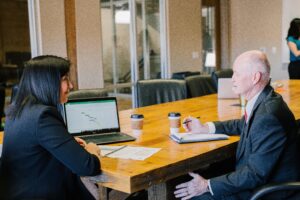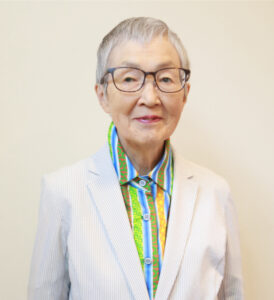The landscape of our workforce is changing as we are living longer. Across the 38 member countries of the OECD (Organization for Economic Co-operation and Development), the ratio of older people aged 65 and over to people of working age (15-64) is projected to reach 8 in 20 by 2050, from 5 in 20 in 2019. As the world’s population is projected to be 9.9 billion in 2050, about 21% (2.1 billion) will be over 60 years.1
The gift of longer life expectancy creates an opportunity for longer economic contribution and sustained economic growth – and older workers are crucial for the success of a multigenerational workforce.

Photo by Amy Hirschi
However, to harness this new, longer workspan and support this transformation, we must create opportunities for age-friendly policies, such as providing more flexible work options and retirement options, promoting lifelong learning, and creating age-friendly workplaces and overall better working conditions.
Investing in retraining, re-skilling and upskilling improves employability of all workers throughout their lives. Access to these opportunities ensures full participation of workers for a thriving economy and health of the population.
There are several misconceptions regarding the contributions and continued employment of older workers. Age is not the only factor influencing workforce participation; advances in technology and changing structures impact all workers regardless of age.
“Acquiring new skills or sharing skills with others are enriching experiences. Yet, it seems that for older adults this is still more often regarded as a challenge, rather than a springboard for a new career or a new role at the workplace. Employers and co-workers thereby lose out on an enormous asset that older workers can bring with their professional and life experience,” says Dubravka Šuica, Vice President for Democracy and Demography at the European Commission.
We need to move beyond these stereotypes and create inclusive policies and work environments that accommodate an extended workspan. Some countries are tackling this head-on by raising the retirement age, and in some cases abolishing the retirement age altogether for those who wish to continue working. Overall, as policies are developed, we must not forget that older workers are a very diverse group.
“While re-skilling at any age is becoming a reality for many, the contribution that older workers can make in this effort is not yet sufficiently tapped. By mentoring and guiding younger colleagues, older workers can pass on their expertise and knowledge while transitioning into new roles themselves,” continues Šuica. “Can you imagine a better win-win situation?”
So, how do we best engage older workers and realize this win-win situation?
We asked a few members of the Global Future Council on Healthy Ageing and Longevity to provide insight. Here’s what they said.
“Acknowledge that age has nothing to do with learning.”
Takanori Fujita, M.D., Project Lead for Healthcare Data Policy, Japan

Masako Wakamiya. Photo by Araisychei
In Japan, the Labour Act supports older adults to work until age 70, urging employers to raise mandatory retirement age to 70 or in some cases abolish retirement altogether. Masako Wakamiya, a Japanese woman, shows that age has nothing to do with learning. She bought her first computer at age 58 and invented Excel Art, using Microsoft Excel as a design tool for clothing fans. At age 81, she developed a smartphone app called “hinadan“, a game aimed at older users, attracting attention as the world’s oldest app developer. Now at age 86, she holds workshops to teach seniors how to use a smartphone. From the perspective of the digital divide that hinders inclusiveness, we should consider the improvement of literacy not only for workers but also for all members of society.
“Redefine and expand roles.”
Maliha Hashmi, Executive Director; Health, Wellbeing & Biotech, NEOM Innovation Hub, Saudi Arabia
Redefine and expand roles to accommodate the aging population. With a deficit of 400,000 doctors by 2030 spread over 32 OECD countries, population aging has caused demand for health services to soar. This same ageing population can support this demand through recent innovations. For example, the challenges posed by the pandemic have increased the use of ‘virtual care’ everywhere. We can balance the deficit of doctors and utilize the effectiveness of digital health systems by redefining and expanding roles – such as ultilizing members of the ageing population who can serve on teams of life coaches, psychologists, nurses and nutritionists that become the first point of healthcare.
“Create opportunities for older workers to strengthen adaptability and resilience.”
Amal Abou Rafeh, Department of Economic and Social Affairs (DESA), United Nations
The growing complexity of the future of work demands a lifelong learning system that provides opportunities for older workers to strengthen their adaptability and resilience. Investments in re-skilling and upskilling efforts should be adapted to older persons’ unique needs, motivations, preferences and diverse identities. In addition, investments should enhance older people’s ability to stay employed or move easily between the job market. Re-skilling efforts also heighten one’s sense of self-worth, dignity and fulfillment. These efforts should not exclude older workers in the informal economy, those living in remote rural areas, members of ethnic minorities, refugees and migrants who often have poor access to training.
“Deploy new technologies to support older workers.”
Andrew Scott, Professor of Economics, London Business School, U.K.
The coming years will see the intersection of new technologies and a growing proportion of older workers. The former can support the latter in three ways. Firstly, by providing new accessible and engaging ways to learn. Secondly, through using robots to make existing jobs physically easier to perform. Third, and most important, is for technology to augment rather than replace human skills in the workplace.
As machines become smarter at being machines, humans can focus on their human strengths. Research suggests older workers have a comparative advantage in many of these new technologies, which offer multiple ways to support an older workforce.
“Ensure access to lifelong learning opportunities.”
Jean Setzfand, Senior Vice President, Programs and Debra Whitman, EVP and Chief Public Policy Officer, AARP (American Association of Retired People), Washington, DC

Photo by Ahsan S.
Workers of all ages want to develop and maintain skills that are relevant to the workplace. Given the constant changes in skills needed over time, it’s imperative that we all become lifelong learners. But training and skill development opportunities aren’t always equally offered to older workers.
Workers, companies, NGOs and policymakers should work together to ensure that re-skilling and upskilling opportunities are offered and presented so that older workers can easily participate. While lack of time, financial resources and information asymmetries often prevent older workers from seeking training, strategies such as micro-credentials (online or in-person educational courses, training programs and certifications that can be added together toward earning an advanced degree) and other nonlinear educational paths, such as returnships (programs designed to help individuals relaunch their careers after a break, with mentorship and support), internships, apprenticeships, and job sharing should be designed to meet the targeted needs of older workers.
- Statistics from Ageing and Employment Policies Overview; OECD.
Excerpts from an article originally published in weforum.org
Licensed under a Creative Commons Attribution 2.0 Generic License.







